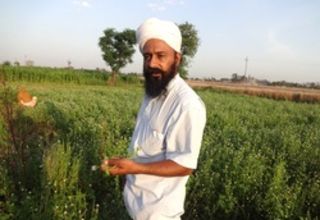Gurtej Singh, Mehatpur, Jalandhar - A natural devotee, by grace of Gurus

Gurtej Singh is a devout man but he does not regard religion just as a theory which has to be substantiated through rituals. He knows several verses of Gurbani by heart and always relates them to life. From Guru Nakak to Bhagat Dhanna Jatt, he reflects how all the great preachers always talked about relation between man and nature. “Religious hymns-also talk about biodiversity and simple living. But now everything is lost in rituals. We bow our heads to cows roaming on the streets but don’t know why we are supposed to value them. The traditional knowledge about having a cow at home is absent,” he laments
Living in a big house with all the modern facilities, it’s a pleasant surprise to know that Gurtej has not ignored the traditional way of living. His family grows indigenous varieties of crops and vegetables through natural means, has a wheat mill at home, and uses copper and earthen vessels to cook food.
It was in 2007 that Gurtej read about organic or natural farming in a Punjabi newspaper. Some guidance by a distant relative and Kheti Virasat Mission got him started on 1 acre which soon expanded to 6 acre. “Nowadays, farmers take farming as just another business. They have forgotten that this is the only occupation which feeds generations and keeps them physically and mentally sound. We are because of the food we eat and food is there because of the soil. Unless we improve the soil quality, how can we expect a healthy society,” he asks and answers almost immediately: “There’s no better place to start from than home.” Gurtej grows most vegetables, wheat, maize, basmati rice and fodder naturally and now aims to reduce market dependency for fruits. “At least we should have those which grow naturally in Punjab,” he beams.
To those who ask him about the yield he’s getting, Gurtej suggests they look at the balance sheet. “With natural farming, you save anywhere between Rs 6,000-8,000 per acre besides reduction in water use and increased soil health. The food being healthier is a bonus. But it’s not easy to explain this to people who think only in terms of monetary benefits. They are too scared to experiment and lack the courage to go organic,” he informs as a matter of fact. Initially, his mother was also not in favour of taking such drastic steps. But today she understands and in fact has taken responsibility of several tasks like preparation of organic manure using cow dung and urine.
Gurtej feels the battle against agrochemicals won’t be won in one day since the problem did not emerge in one day. “But we have to take steps today. At the end, the world has to return to nature as it’s the only way forward. It may take 100 years but the nature will reclaim what it rightfully owns. The reverse counting has already started as soil and water health are declining. One day nothing will grow and we will be on mercy of nature again,” he says firmly.
Contribution by Manu Moudgil